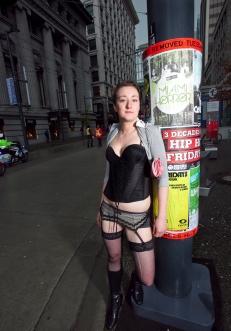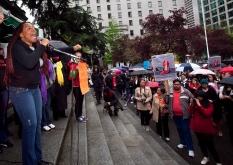
SlutWalk attendee Lauren Gill said some men think they can "join in" when they see her walking down the street holding hands with a woman. "As a lipstick lesbian we are so hyper-sexualized." Credit: Sarah Race photo
“When we keep victim-blaming and sex-shaming alive, and when we call women sluts, the only people we’re helping are the assailants,” said Katie Raso, organizer of SlutWalk Vancouver, held May 15.
More than a thousand women, men, youth and children ignored the persistent rain and gathered at the Vancouver Art Gallery to spread a message: society must change from a “Don’t get raped culture” to a “Don’t rape culture.”
Participants marched through Granville St carrying placards that read: “I will not be ashamed of my sexuality,” “Clothing is not consent,” and “Bought me dinner? I don’t owe you anything!”
Most marchers were fully clothed, some wore bustiers and fishnet stockings, and others, like Greg, who requested his last name not be used, marched nearly nude.
“Women or men, whatever they’re wearing, if they’re victimized then they’re the victims, not the perpetrators,” he said, walking bare-assed, wearing nothing but a backpack and a bandana around his hips.
The first SlutWalk, staged in Toronto on April 3, was organized in response to a Toronto police officer’s suggestion during a York University campus safety lecture that women shouldn’t dress like sluts if they wanted to avoid sexual assault.
Since then, similar marches have been sprouting up throughout Canada, the United States and Europe.
“I’m so sick of being told that what I wear will impact my human rights,” said 30-year-old Kaije Rae, who attended the Vancouver march in cling wrap, a G-string and a shocking purple wig.
“The tone of the [Toronto] police officer’s comment represents a pervasive attitude in our legal system and in our culture,” added Ariana Barer, of Women Against Violence Against Women [WAVAW].
In a February court case, a Manitoba judge called the perpetrator of one sexual assault a “clumsy Don Juan,” adding that because of the way the woman was dressed and because she had met her attacker at a bar, “sex was in the air,” and there were “inviting circumstances” that led to her being raped in the woods on a dark highway in 2006.
Closer to home, a Saanich police officer suggested that a young woman, who had been walking from one party to another near the University of Victoria, was responsible for her rape, in which she was pushed into a car and repeatedly assaulted by three men in March.
“If women had equality in our society this wouldn’t even be an issue,” Barer said.
“It’s about power,” Vancouver Councillor Ellen Woodsworth told march-goers. “And what we’re about is the power to change.”
But while the movement has gained widespread appeal, SlutWalk critics have expressed concern about the use of the word slut in the event’s name. Xtra‘s attempts to reach those who posted their disapproval on the event’s Facebook page were unsuccessful up to press time.
“We’ve had people ask us why we would use such an ‘unpleasant’ word,” said organizer Katie Nordgren. “It’s a word used to shut women down [and] to devalue them. We are using a word that makes people feel uncomfortable because they should be uncomfortable,” she argued.
Labelling women or girls sluts is about “keeping us in our little boxes,” added Angela Marie MacDougall, executive director of Battered Women’s Support Services.
“For many of us, particularly those of us of colour, and certainly indigenous women, the word slut has profound meaning,” she noted. “For us, that paradox between Madonna and whore, we just don’t have that paradox. It’s just whore.”
There was a strong queer presence at the march, which did not surprise Vancouver School Board trustee Jane Bouey, who was in attendance.
“We’re impacted by violence directed at people’s gender expression as well as sexual orientation,” she noted.
Lauren Gill, who is a lesbian, said some men have the idea that they can “join in” when they see her walking down the street holding hands with a woman. “As a lipstick lesbian we are so hyper-sexualized, guys often think they have every right to just intrude.
“It’s a huge problem,” she continued. “I wish people talked more about lesbians and sexual harassment.”
So far, there have been SlutWalks in Toronto, Ottawa, Boston and London, UK, to name a few. Other walks are planned for the summer in a number of US cities, including Seattle, San Francisco, Chicago and New York.

 Why you can trust Xtra
Why you can trust Xtra


